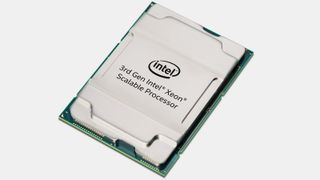Intel and AMD to Dominate Server Market, Arm Not Competitive Until 2023
Every third server will be Ice Lake-based by late 2021

The penetration rate of Intel's 3rd Generation Xeon Scalable 'Ice Lake-SP' processor will surpass 30% by the end of the year, which is a typical transition rate for server CPUs, and x86 processors don't have much to worry about from Arm servers until 2023, according to estimates by TrendForce. The vast majority of servers shipped this year will be based on Intel's 2nd Generation Xeon Scalable 'Cascade Lake' processors Meanwhile, AMD is on track to grab a 15% global server market share in 2022.
Despite efforts of companies like Amazon, Ampere, and Marvell, Arm-based system-on-chips (SoCs) for servers will remain niche products with a 3% market share due to the relatively small scale of client demand, TrendForce claims.
Built-to-order Arm-based servers will not be competitive with x86 machines until at least 2023, according to analysts, so both AMD and Intel will enjoy their domination on the lucrative market for years to come.
Wide Adoption of Ice Lake-SP and Milan to Start in Q3
Intel started limited shipments of its Xeon Scalable 'Ice Lake-SP' processors in Q4 2020, when these CPUs were given PRQ status. Then the company ramped up its production in Q1 2021 and officially launched the chips in high volumes in the second quarter. Intel's rival AMD launched its EPYC 'Milan' processor in mid-March.
Server makers only began to widely adopt both Intel's Ice Lake-SP and AMD's Milan processors in the third quarter, TrendForce claims. However, the pace of penetration for Intel's latest server platform codenamed Whitley is expected to be typical, so by the end of the year, these CPUs will likely control 30% of the market, analysts believe. By contrast, AMD will continue to gain share at Intel's expense, so its server market share will get to 15% sometime in 2022.
Next-Gen Server Platforms to Arrive in Q2 2022
The analysts' expectations about AMD's next-generation EPYC 'Genoa' platform and Intel's Eagle Stream platform (based on Sapphire Rapids processors) are more interesting.
TrendForce projects that AMD will introduce its EPYC 'Genoa' CPUs in Q2 2021. These chips will feature the company's all-new Zen 4 microarchitecture and will bring in support for DDR5 memory, which will boost their performance. The processors are made using one of TSMC's N5 fabrication technologies. Due to the brand new design of Genoa processors, they will use a brand-new socket and a platform, so their ramp will take time.
Stay on the Cutting Edge
Join the experts who read Tom's Hardware for the inside track on enthusiast PC tech news — and have for over 25 years. We'll send breaking news and in-depth reviews of CPUs, GPUs, AI, maker hardware and more straight to your inbox.
TrendForce expects Intel's Sapphire Rapids to get to the PRQ stage sometime in Q4 2021, start shipping in Q1 2022 and be formally released in Q2 2022, something that Intel has confirmed already. Intel's Eagle Stream and Sapphire Rapids will not only significantly increase performance by adding more CPU cores and putting HBM2E cache onboard, but will also introduce a number of new technologies, including DDR5 memory, next-generation Optane Persistent Memory modules, and PCIe 5.0 interface with CXL (Compute Express Link) protocols on top.
PCIe Gen 5 interface with its 32 GT/s data transfer rate and a maximum bandwidth of up to 63 GB/s in both directions over 16 lanes will be particularly useful for high-performance SSDs. Such drives will radically change how servers perform in storage-intensive workloads.
Given all the innovations that Intel's 4th Generation Xeon Scalable (or whatever its formal name is set to be) will bring, it will be interesting to see how rapidly the market will adopt the new Eagle Stream platform. Meanwhile, before this platform ramps, Intel will continue to increase shipments of its existing Whitley platform based on Ice Lake-SP.

Anton Shilov is a Freelance News Writer at Tom’s Hardware US. Over the past couple of decades, he has covered everything from CPUs and GPUs to supercomputers and from modern process technologies and latest fab tools to high-tech industry trends.
-
JayNor 1H 2022 for zen4 Genoa? Is AMD sampling? Intel reported sampling Sapphire Rapids in Nov, 2020.Reply
Most Popular






